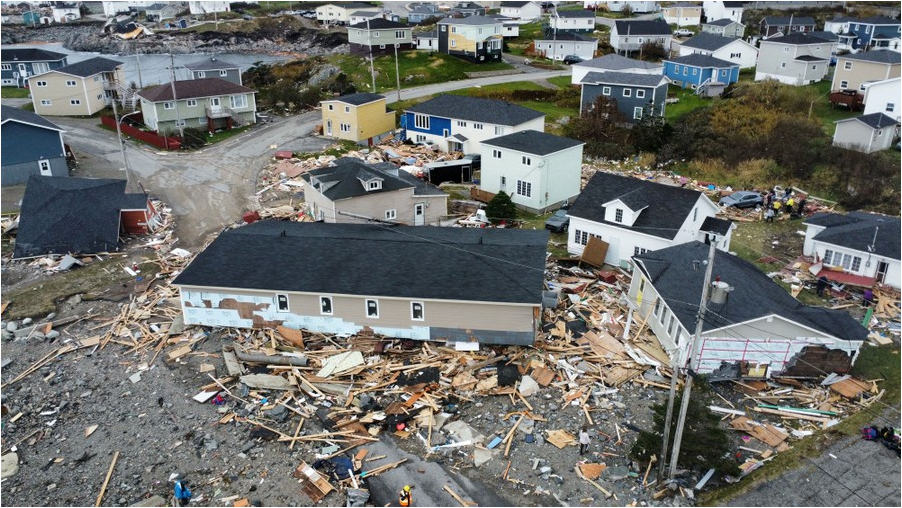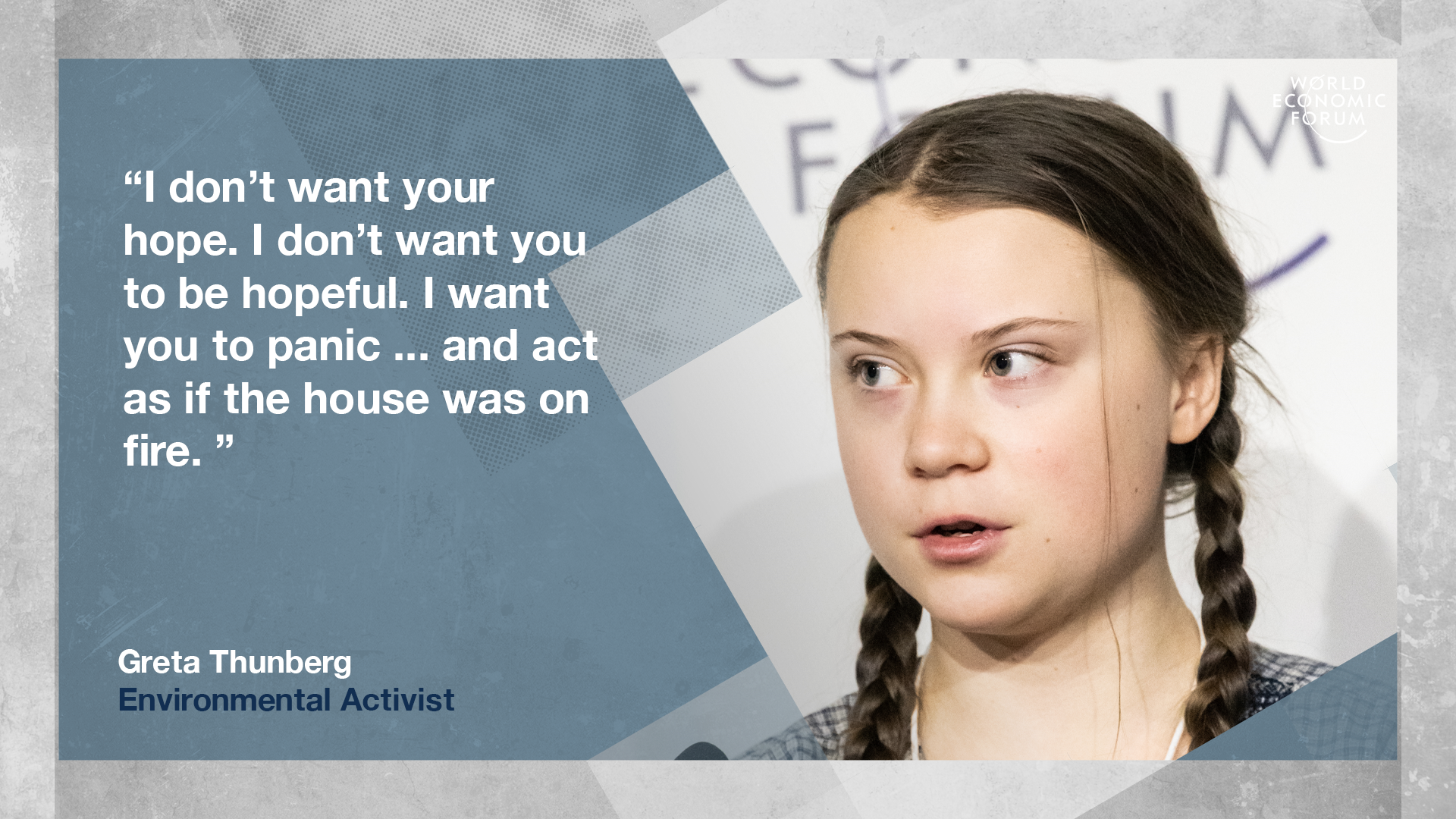Hurricane damage: Not Florida… Canada!

Global warming gives extreme weather more energy to play with. Unless global warming is stopped and reversed, economies will begin collapsing.
More areas will suffer more extreme damage more frequently, effecting more people…. Until economies can no longer repair the damage from the last catastrophe before the next catastrophe strikes, and begin to collapse into anarchy and chaos…. The same extremes will also begin collapsing whole natural and agricultural ecosystems, eventually leading to mass extinction as the process accelerates.
For example:

By Alan Taylor, 26/09/2022 in The Atlantic
Photos: The Aftermath of Hurricane Fiona in Eastern Canada
After causing heavy damage across parts of the Caribbean and Bermuda last week, Hurricane Fiona moved north toward Eastern Canada, making landfall this weekend as a post-tropical cyclone. The downgraded storm still packed heavy rain and winds, gusting up to 110 mph, driving storm surges and knocking down trees and power lines. Hundreds of thousands remain without power as emergency crews and utility workers work to clear debris and rebuild lines. Below is a collection of recent images from Nova Scotia, Prince Edward Island, and Newfoundland.
For all the pictures, see the complete article….
After striking Puerto Rico and wiping out the entire electrical distribution network for the population of 3 million people on the island, Fiona sideswiped Bermuda, then its storm clouds smashed through the Canadian Maritime Provinces, and ended up as a pool of hot air and rain that melted a record lot of ice in southern Greenland:
With continued global warming these catastrophes can only get worse — as demonstrated last week by Category 3 Hurricane Ian that smashed through Cuba, Florida, and North Carolina, killing at least 125 people as confirmed by body count. I’ve seen no statement of how many are still missing (many victims may have been washed away by the storm surges). This case will be discussed in more detail in another article under preparation.
…And then there is the continuing deluge in eastern Australia, where every river in NSW west of the Dividing Range is in flood as I write this.
THESE OBSERVATIONS ARE IMPORTANT!
Stopping and reversing global warming is the only issue that really matters
There is a vast array of scientific and observational evidence showing that not only is the world growing ever warmer (thanks to the profligate burning of fossil carbon beginning with the Industrial Revolution), but that we have now warmed our planet enough that we are beginning to cross ‘tipping points’ for a number of positive feedback processes in the Earth System that will continue driving temperatures still higher even without further human intervention. Once positive feedback takes control of the thermostat, Earth’s temperatures will continue rising at an accelerating rate in a runaway global warming process until semi-stable ‘Hothouse Earth’ temperatures are reached. These temperatures will like be too hot and be reached too fast for large slowly reproducing organisms like humans to survive. The result will be our planet’s 6th global mass extinction event. At least two or three of the previous mass extinction events in our fossil record also seem to have been the result of runaway global warming.
Note: Straightforward laws of physics will produce this result unless humans can stop and reverse the process – and we are approaching a point of no return where no conceivable human intervention will be able to stop the feedback process before the fuel is exhausted or the system self-destructs.
Given that we are major users and producers of greenhouse gas emitting fossil fuels, we have to take the responsibility to do something about this….
We need to turn away from the the Apocalypse on the road to hothouse hell, and we won’t do this by continuing with business as usual!
It seems to have taken the clear thinking of Greta Thunberg, a 16 year-old girl who concluded school was pointless as long as humans continued their blind ‘business as usual’ rush towards extinction.

In other words, wake up! smell the smoke! see the grimly frightful reality, and fight the fire that is burning up our only planet so we can give our offspring a hopeful future. This is the only issue that matters. Even the IPCC’s hyperconservative Sixth Assessment Report that looks at climate change’s global and regional impacts on ecosystems, biodiversity, and human communities makes it clear we are headed for an existential climate catastrophe if we don’t stop the warming process.
In Greta’s words, “even a small child can understand [this]”. People hope for their children’s futures. She doesn’t want your hopium. She wants you to rationally panic enough to wake up, pay attention to reality, and fight the fire…. so our offspring can have some hope for their future.
In our present situation where most of our governments are still supporting and even funding fossil fuel production and use, the most effective actions we can take as individuals is to change our governments to prioritize action on climate change above all other things. Nothing else matters if we have no future….
States are probably even more important than the Federal Government where climate action is concerned
States enable and regulate mining and production of fossil fuels, and many of the important sources of emissions. Planning, industrial, rural, public safety and others are all primarily state concerns where political and administrative decisions may have considerable impact on regulating carbon emissions. Thus, if you are concerned to influence how your state acts in relation to the climate emergency, you need to elect representatives who will do this rather than bow down to wealthy patrons and vested interests who want to protect their short-term profits rather than humanity’s longer-term future.
Applying your decision to preferential voting on the ballot
If you believe that our present COALition government will govern in your interests rather than their patrons in the fossil fuel and related industries, then go with the flow and don’t concern yourself with the likely consequences of going down their fossil fueled road towards runaway global warming. On the other hand, if you think it is better to work for a sustainable future where your children and their children can hope for a happy future, Vote Climate One can help you elect a government that will actively lead and support this effort.
Our Climate Sentinel News provides access to factual evidence about the growing climate crisis to support your thinking, In the May Federal Election, our Traffic Light Voting System made it easy to use factual evidence about where each candidate in your electorate ranks in relation to their commitment to prioritize action on the climate emergency. We have modified this for the Victorian State Election in November.

Featured image: Debris surrounds storm-damaged houses in Port aux Basques on September 26. # (John Morris / Reuters — from the featured article)